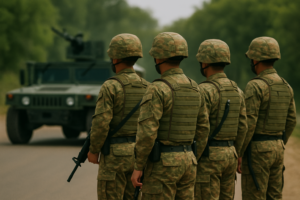The classrooms can positively contribute towards the progressive and bright future of the nations if they’re equipped with advanced technologies, modern study material, well-behaved teachers, and a comprehensive curriculum.
Introduction:
Classrooms are the places where students can sit calmly to focus on the subject matter. No matter which subject, one is going to consult; the classroom is equally essential, and facilitates the teaching process. The classroom provides a space where learning can take place without any outside distractions.
Classrooms inject a sense of equality when students from different socioeconomic and different religious and ethnic backgrounds sit side by side. This displays a unique gesture of social harmony as well as etiquette.
There’s no formal division on the basis of caste, color, and creed inside a classroom. There’s no iota of doubt in the fact that classrooms are the places where masses learn to respect humanity, human rights, respect, moral values, and important traits to become a good person and contribute positively to the future of the nations.
It is the classroom that enables a human being to learn different skills, get the traits of hard work and determination.
The future of disciplined, passionate, and progressive nations is always deeply connected with the environment of classrooms where the future workforce, as well as future leadership, undergoes stages of learning and experience.
Types of Classrooms:
Before discussing the role that classrooms play in deciding the overall future of a nation, we’ll first have a cursory look at the various types of classrooms. Classrooms exist in a variety of forms. They are lecture classrooms, auditoria lecture classrooms, seminar classrooms, case-study classrooms, and interactive computer classrooms.
Classrooms with a level floor and capacity of 17-150 are lecture classrooms. Desks usually have tablet arms and face the teaching area. The auditoria lecture classrooms are equipped with a sloped floor or stadium seating with a capacity of 67-247. In seminar classrooms, however, tables are usually set in solid square or hollow square style.
Classrooms with inclined seating with a capacity of 60-65 and chairs placed at semi-circle desks facing teaching areas are case-study classrooms. In interactive computer classrooms, all workstations have a desktop computer/monitor and face the teaching area.
Facts of Classrooms; Shaping the Future of Nation:
Various facts ascertain that classrooms play a very symbolic and predominant role in shaping the future of any nation. The very first and dominant role that classrooms play in deciding the future of the nation is the contribution of classrooms in producing future leadership for the nation.
Nelson Mandela, Mahatma Gandhi, Martin Luther King, Muhammad Ali Jinnah, Albert Einstein, and so many others who left their mark on world history have been in the classrooms and learned the traits that enabled them to become remarkable individuals worldwide.
It is the classroom education that instills into one’s subconsciousness the traits of time management, organization, accountability, persistence, ability to delegate, and communication skills.
It is the classroom that give political awareness to the people. The students who spend their time inside the classrooms have somewhat more consultant attitude towards a democratic norms and show relatively greater political awareness than those who have never been a part and parcel of classroom environment.
A number of researchers have concluded that elementary schools are very essential in shaping an individual’s political attitude and enlarges the base of the student’s political knowledge.
Apart from basics such as voting rights, political awareness encompasses all sorts of ambit of civic duties and the rights of citizens as well.
One of the many reasons why citizens are unable to challenge wrongdoings in society is because they are unaware of how to do so. These issues stem from the fact that people are unaware of the frameworks of politics and legalities in society.
Perhaps, it is the classroom that instills in the masses respect for human rights as well as basic rights. Human rights are basic rights that belong to all of us simply because we are human.
They embody key values in our society such as fairness, dignity, equality, and respect. In classrooms, the masses get awareness and education about the importance of human rights, carry out researches into the prevailing human rights violations in different parts of the globe.
All these things ultimately led to the ways that address and resolve the problems of humankind and push the policy making process in decision-making circles.
It is the classrooms that remove social biases from the minds of the students leading to the formation of an integrated society.
Social cohesion among individuals is the result of a classroom environment that sensitize the people regarding the unity of purpose and neglect the cultural, racial, political, and social biases.
Moreover, classrooms Inject the virtues of patriotism into the minds and hearts of people and let them know how to live in harmony.
The national-level celebrations of different historical events and relics are done in classrooms. These events create in the minds of students a love for one’s culture and national roots.
Patriotism to Workforce & Moral Values: Classroom Nurture Everything:
Classroom-education and patriotism are deeply inter-related. Politics and patriotism in education somehow explore the ideological battles that are being waged in the name of patriotism.
A student can get a deep understanding of the roots of national ideology as well as a political basis only by going through the classroom education learned formally or informally.
Furthermore, classrooms are the places where the skilled-labor of any nation is produced. The alumni that passed out of various professional education institutions got the training and information about the particular skills and field of knowledge in classrooms.
Technologically more advanced and well-equipped classrooms would surely produce a more elegant and refined workforce. This skilled-labor then serves in the different departments as well as fields of work and participate in the progress of a nation.
Besides all these virtues and specialties, classrooms impart the sense of justice and moral values in the masses. The well-educated people understand the importance of personal integrity and democratic rights.
They challenge any power that abrogates or put in abeyance the rights of people. For this purpose, they move to courts and file cases against the oppressor and sometimes take to roads to put forward their just demands.
For instance, the recently enacted Citizenship Amendment Act in India stands in clear violation of the Constitution of India and international human rights.
The controversial law legitimized discrimination on the basis of religion. It seeks to legally establish Muslims as second-class citizens of India by providing preferential treatment to other groups. This violates the Constitution’s Article 14, the fundamental right to equality for all persons.
People of India especially student unions and activists from various backgrounds took to roads in order to malign the undemocratic act of government and refused to accept the status of second-class citizens.
Barricades Hindering Classroom to Develop the Future of a Nation:
Some of the barricades that hinder the classrooms to develop the future of a nation are; poverty, ill-informed policy-making, low budgetary allocations, lack of political will, division of syllabi on the basis of socioeconomic status of students as well as business interests of some self-styled stakeholders in the education sector.
Some of more factors that compromised the role that classrooms play to enlighten the future of nations are: ill-advised policies of the government, the turbulent political atmosphere of the nation, warlike emergency in any nation, vested interests of the political elite, poor focus on character building of students, and budgetary constraints.
Unplanned and rapid population growth also hinders the efforts to establish a bright future for the nation by educating the masses at large.
These very problems can be overcome by adopting a target orientated and meticulously planned approach that can overhaul the overall environment of the classrooms.
In a developing country like Pakistan, socioeconomic barriers, as well as stereotypical believes also make it difficult to transform the nation into a progressive, and more responsive community of people.
The warlike situation in Yemen has greatly affected the situation of classrooms. A civil war raging in Yemen has claimed more than 16,000 lives and left 13 million people on the brink of starvation.
The conflict has been dubbed a “proxy war” among competing powers in the Middle East as a Saudi-led coalition battles rebels backed by Iran.
The situation of schools is not different from the rest of the nation. Schools in Yemen have been bombed, damaged, destroyed, or occupied even though they are meant to be protected under international law.
By 2019, UNICEF found that one in five schools could no longer be used because of the conflict. Even school vehicles have been hit. This kind of scenario is really worrisome to continue the classroom activities.
Conclusion:
The classrooms can positively contribute towards the progressive and bright future of the nations if they’re equipped with advanced technologies, modern study material, well-behaved teachers, and a comprehensive curriculum.
Above all, an environment of peace and tranquillity is mandatory to let these classrooms their very purpose in shaping the overall future of the nations.
It is high time that everyone should be highly concerned with the position of classrooms because students studying in one part of the world while sitting in a cornered classroom can somehow influence the students in any other part of the world at some stage in life.
The world is a global community, and it’s our collective responsibility to take part in the well-being of it beyond the limits of national borders.
Read Also: Online Education System Of The United States
📍 English Language Educator | Blogger & Content Strategist | 7+ Years in Educational Blogging
Nosheen Bashir is a dedicated English teacher and experienced blogger with over seven years of expertise in content creation and educational writing. Passionate about language, literature, and effective communication, she combines her teaching experience with blogging skills to create insightful, research-backed content that helps learners and educators alike.
🔹 Expertise & Achievements:
✔ English Language Education: A skilled educator with years of experience in teaching English grammar, literature, and communication skills to students of varying levels.
✔ Educational Blogging: Running a successful blog for 7+ years, delivering well-structured, engaging content on language learning, writing techniques, and academic success.
✔ SEO & Content Strategy: Specializes in creating high-ranking, authoritative articles that follow Google’s EEAT principles, ensuring content that is both informative and search-friendly.
✔ Student-Centric Approach: Committed to making English easier, engaging, and accessible, helping readers and students improve their language proficiency.
🚀 With a passion for teaching and writing, Nosheen Bashir is dedicated to crafting educational content that empowers students, teachers, and language enthusiasts worldwide.









